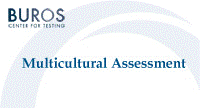Buros-Nebraska Series on Measurement and Testing

Multicultural Assessment in Counseling and Clinical Psychology
Date of this Version
Spring 1996
Document Type
Front/Back Matter
Citation
Published in Multicultural Assessment in Counseling and Clinical Psychology, edited by Gargi Roysircar Sadowsky and James C. Impara (Lincoln, NE: Buros Institute of Mental Measurements, University of Nebraska–Lincoln, 1996).
Abstract
The book has shown the use of a combination of approaches to understand the nature of a problem: traditional diagnosis and standardized assessment, cultural and racial explanations as alternative hypotheses, clinical judgement based on a decision-tree involving cross-cultural and indigenous frameworks, quantitative-qualitative methods of data analyses, and the use of multicultural paper-and pencil and projective tests. The attitudes and cognitive-affective tests presented or referenced in the book, in addition to being formally administered, could be used as springboards for collaborative discussions with clients and psychology trainees in order to gain a better understanding of their values and assumptions and, by inference, their modes of problem-solving in a multicultural society. We look forward to these new instruments' future refinements, psychometric enhancements, and diverse sampling of subjects.
The measurement of acculturation attitudes is important in counseling and clinical psychology. Its importance to applications has been affirmed by the 1994 Diagnostic and Statistical Manual of Mental Disorders (DSM-IV), and the 1993 APA Guidelines for Service Providers to Ethnic, Linguistic, and Culturally Diverse Populations, the latter stating that psychologists must document culturally relevant factors in client records, including number of generations in the country, number of years in the country, fluency in English, community resources, level of education, and level of stress related to acculturation. Because a multicultural book is incomplete without addressing issues of acculturation, Appendices A and B provide measurement and research information on acculturation scales. Appendix A summarizes select psychometric properties of and predictions for frequently referenced acculturation scales developed for Hispanic/Latino and Asian groups in the U.S. Appendix B summarizes select counseling psychology studies showing the effects of acculturation on client reactions. At the end of each Appendix is a reference list of the authors of the instruments and related research studies.
We hope this work, Multicultural Measurement in Counseling and Clinical Psychology, will add to the long and colorful history of psychological assessment.


Comments
Copyright © 1996 by Buros Institute of Mental Measurements. Digital edition copyright © 2012 Buros Center for Testing.